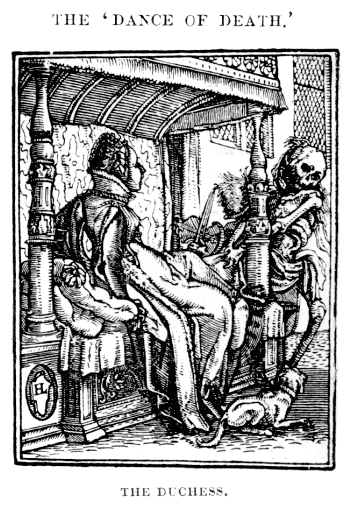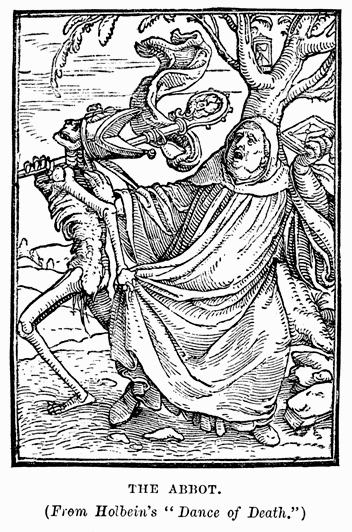

Full-length historical fiction
from Jeani Rector
Paperback $8.49
There may be a lot of end-of-the-world apocalypse stories...but none like the bubonic plague in 1348 England.
See a Black Plague Video* HERE
*Video not made by or connected with The Horror Zine
Paperback $8.49
Kindle $2.99

ROMANCE AND DEATH
Back Cover Text:
As the daughter of the Lord of Wynham Castle, Elaisse hears rumors of a great pestilence in France. She tells herself that God is punishing the French people because of the on-going war with England. She consoles herself that England is on the side of all that is right, therefore England is safe.
And then Elaisse travels to London where suddenly the whole world changes around her. Circumstances arise beyond her control and she goes from a structured, sheltered life into one where normalcy falls by the wayside. The pestilence has come to England. The threads of her existence begin to unravel as the cart-man in the street calls for people to “Bring out your dead.”
PESTILENCE: A MEDIEVAL TALE OF PLAGUE is historic fiction, delving into a first-person account of life during the European plague years of 1346-1350. Today there are many end-of-the-world tales, but the bubonic plague pandemic in the 14th Century is the original apocalypse story.
BOOK EXCERPT # 1:
She felt that life was beginning to unravel, just as her garments would if they were not sewn properly.
The sickness arrived in London.
The tell-tale signs began subtly. A few less customers here, a few more rumors there.
Then the pace began to quicken. Elaisse noticed that people began wearing handkerchiefs over their noses and mouths, and they filled their pockets with sweet-smelling herbs. They refused to shake hands, and avoided displays of grief as they mourned lost loved ones, and others retreated into the dark holes of their tenements to grieve alone. Every so often, someone would stand in the streets and read Bible verses to the passers-by, not caring if no one listened.
But the worst was the man with the push-cart that traveled the streets of London once a week.
“Bring out your dead!”
The call would reverberate through the streets, and Elaisse cringed when she heard it. She never looked out the garment shop window to see the man with the push-cart, so her imagination about him ran wild.
In her mind, the man pushing the wagon was an evil monster, drooling over how many dead people he could gather, and clenching his yellowed, sharpened teeth in glee over the lifeless, stiff bodies piled high in his cart.
BOOK EXCERPT # 2:
Continuing her walk down the street, she came across an elderly woman, all draped in shawls. The woman was making her way slowly, hunched and shuffling.
“Have you seen the wagon that carries off the dead?” Elaisse asked her.
“Gone. There are no more carts to carry off the dead,” the woman said. “Probably the one who pushed the cart is dead himself.”
“But there is a dead man in the house where I’m staying, and he needs to be taken care of.”
“Even if the cart-pusher were still taking corpses, where would your dead man be buried? There are no graveyards left that are not already overflowing with bodies. I hear the dead are even being thrown into the Thames. And priests! Well, I haven’t seen one in weeks. The churches are empty, save for the sick who are praying for their own salvation, because there are no priests to do it for them,” the woman said as she shook her head sadly. “Go home. You cannot find help for your dead man. Go home and worry about yourself.”
Elaisse was stunned. She tended to believe this old woman. It felt like the truth. There would be no one to help her.

Take the Diabolical Black Plague Quiz HERE
PESTILENCE: A MEDIEVAL TALE OF PLAGUE
This is not a collection of short stories. This is a full-length novel of historic fiction.
A very well-researched book full of facts about that time, how people lived, and the disease itself, yet it tells the story at an exciting pace. — Larry Green, Death Head Grin Magazine

REVIEW IN CAFE DOOM
Jeani Rector says:
I originally got the idea because although there are a lot of works published about the second pandemic of plague in 1665, there was not a lot available about "the big one" in 1348 medieval times. Pretty much the only thing I found that was a first-person account was The Decameron, and that offers only the first few pages before it delves into the storytelling about other subjects.
I read a lot of very good non-fiction about the issue, such as Robert Gottfried's THE BLACK DEATH, but where are the historical fiction books about a person's point of view who experiences such an event first-hand?
There is historical fiction about plague titled THE YEAR OF WONDERS but again, that one deals with 1665 and is only about one small village.
So wouldn't you wonder: what would it be like to actually live through the real end-of-the-world apocalypse of 1348? The one where 1/2 to 3/4 of the entire world's population perished?
Wonder no more, I wrote it. It took me a long time, because everything is researched for accuracy. Yet, there is a story to it, and that story is about how someone would feel, and how she could possibly deal with an event of such horrific magnitude.
